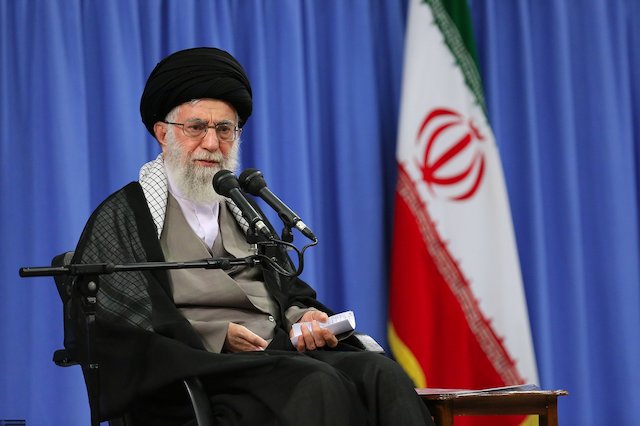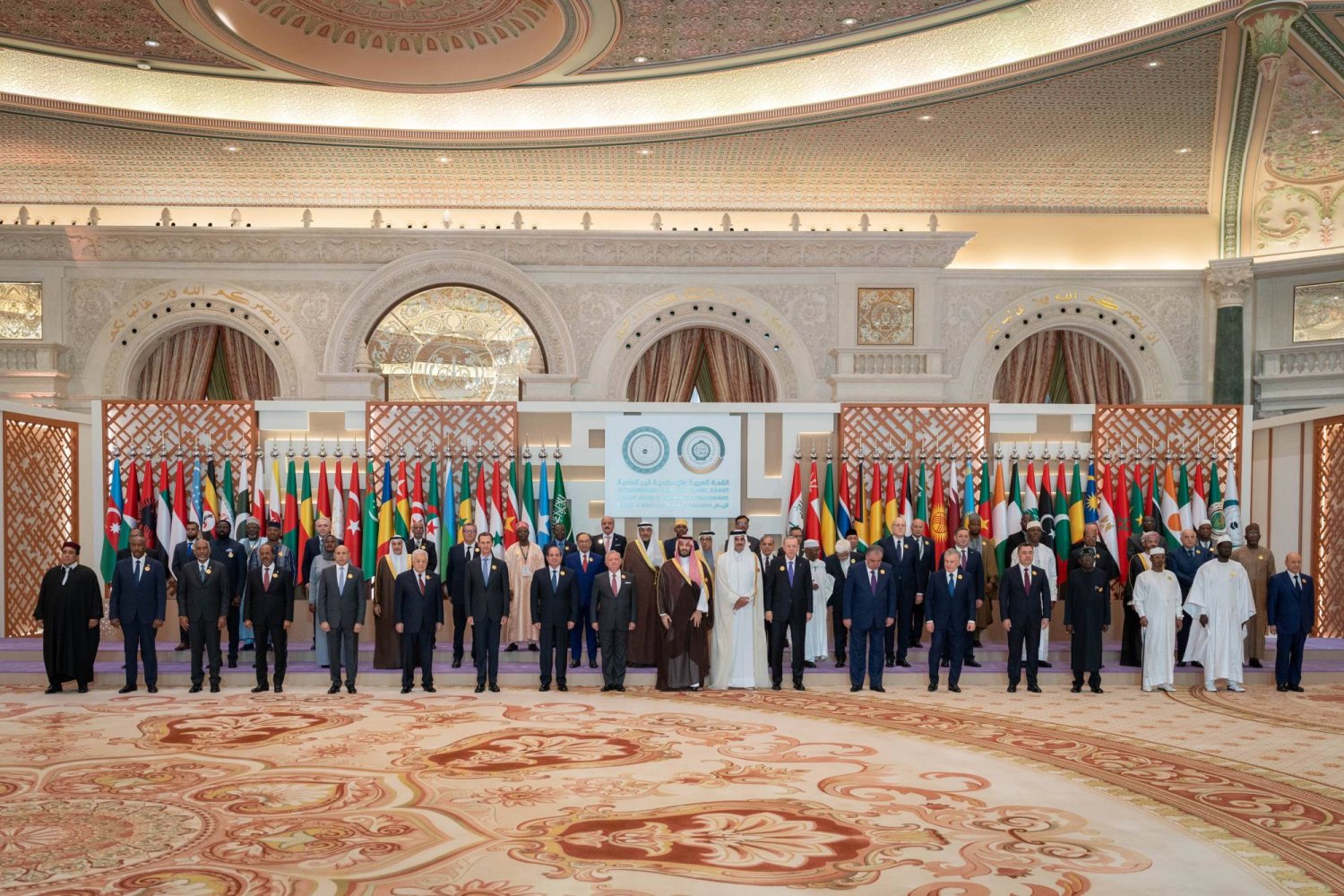المرشد.. حرب سوريا دفاعية
عبد الرحمن الراشد/الشرق الأوسط/07 كانون الثاني/17
يرى المرشد الأعلى في إيران، آية الله خامنئي، أنه لولا جنودبلاده الذين قتلوا في حرب سوريا لاضطروا لمقاتلة عملاءأميركا والصهيونية في طهران وفارس وخراسان وأصفهان.يمكن أن نعتبر ما قاله خامنئي أمام شعبه وذوي القتلى، مجردتبرير للخسائر البشرية التي منيت بها إيران في حربها فيسوريا، التي لا يوجد لبلاده حدود معها. وقد يكون لكلامه معانبعيدة وصادقة، مثل أنه توجد تهديدات في داخل إيران علىالنظام، وأن نقل الحرب إلى الخارج ضرورة من أجل سلامةالنظام.
القيادة الإيرانية باتت تكرر الحديث والتصريحات عن مبررات حروبها الخارجية من أجل إسكات الأصواتالناقدة التي تعترض على التضحية بقوات بلادهم في حروب غير ضرورية، ترضي فقط غرور القياداتالدينية والعسكرية في طهران الطامعة في التوسع والهيمنة. إنما كلما طالت الحرب ازدادت الخسائر، فيزدادالاستنكار وتعود التساؤلات، ويفقد منطق مواجهة أميركا والصهيونية معانيه التي استهلكت لأكثر من ثلاثينعامًا، كانت شعارًا هدفه الأخير هو الاحتفاظ بالسلطة.
خلال عقود ما بعد الثورة ظلت القيادة الإيرانية تبرر دعمها للإرهاب، وتغذية العنف الإقليمي والعالمي،وتهديد جيرانها، وبناء مشروعها النووي، والاستعداد للحروب؛ مشروع الدولة الوحيد وآيديولوجيتها، كلذلك بحجة الدفاع عن النفس وأنها مهددة بالغزو من النظام العالمي الغربي الصهيوني. وبعد أن فاوضتإيران ووقعت اتفاقها النووي، وتصالحت مع الغرب، سقطت حجج الخوف من قبل العدو، لكن إيران بدل أنتنفتح وتتحول نحو السلام زادت من مغامراتها العسكرية الخارجية.
تبنى النظام مفهوم عسكرة المجتمع منذ حرب طهران مع العراق، إبان فترة حكم صدام حسين فيالثمانينات. ولم يوقف المرشد الراحل، آية الله خميني، الحرب التي دامت ثماني سنوات، إلا بعد أن مرَّ عليهانحو خمس سنوات من العناد والرفض لدعوات وقفها من قبل الوسطاء الدوليين. فقد خدمت الحرب حاجةالنظام في تصفية بقايا قيادات الشاه، ولاحقًا تصفية القوى المنافسة في الداخل.
كيف يحتاج النظام اليوم إلى المزيد من الحروب لتثبيت أركانه في الداخل، وهو قد قضى على معظمخصومه؟ إيران دولة كبيرة، في داخلها قوى متعددة ليست بالضرورة معادية، لكنها مناوئة للنظام فكريًاواجتماعيًا، وفي دائرة الحكم الدينية والأمنية نفسها قوى منافسة، تتم محاصرتها وأحيانًا تصفيتها. والحروبالخارجية وسيلة قديمة، قدم التاريخ، لفرض السيطرة الداخلية، تقوم بها الأنظمة التي لا تتمتع بما يؤمّنأوضاعها الداخلية. ومع أن إيران بلد فقير داخليًا، فإن أكثر مؤسساته العسكرية والأمنية، مثل الحرسالثوري والباسيج والمخابرات والجيش، غنية وضخمة. وهي تتميز بالصناعات المتقدمة، وتملك شركاتعملاقة خاصة بها، بما فيها بترولية ومصافٍ وشركات استيراد وتصدير وفنادق وغيرها.
مشكلة إيران، وقادتها يدركون المشكلة الآن، أن الحروب الخارجية التي تخوضها بلا انتصارات محسومة؛ففي العراق كلما تم إطفاء حريق نشب حريق آخر. وفي سوريا، وإن نجحت إيران في تحقيق الانتصاراتالمتتالية لنظام الأسد، أن النظام ليس قويًا، فالنظام سيسقط لو سحب الإيرانيون من هناك قواتهم وميليشياتهم.ونتيجة لهذا التوسع في الحروب، لإيران حضور عسكري في اليمن وأفغانستان ولبنان أيضًا، فإن قيادةطهران أمام معضلة لأنها ترفض القبول بحلول سياسية وسطى للأزمات في مناطق النزاع، مما يجعلهامعلقة هناك، وستستمر تقاتل إلى سنوات. السؤال: إلى متى يصبر الإيرانيون على خسائرهم وعلى مغامراتنظامهم؟ الأمر منوط بمدى فعالية الأجهزة الأمنية وقدرتها على إحكام السيطرة على الوضع في الشارع، أماالخطب الرسمية والدعاية الإعلامية فلن تدوم. دعائيًا، إيران استخدمت في البداية مبررات دينية طائفية، إنهاتدافع عن المراقد لكن معظم القتال ليس في محيطه مقدسات. والآن، صار الحديث عن أن القتال في حلبالبعيدة جدا هو دفاع عن أمن إيران الداخلي.
The supreme leader: the war in Syria aims to protect Iran
Abdulrahman al-Rashed/Al Arabiya//January 07/17/
Ayatollah Khamenei, Iran’s Supreme Leader believes that if it was not for the Iranian soldiers who were killed in the war in Syria, they would have had to fight American and Zionist agents in Tehran, Persia, Khorasan and Isfahan. We can consider that what Khamenei said in front of his people and the families of those who were killed, was just to justify the losses of Iran in the war in Syria that is on the borders of his country. His statement might have deep and straightforward importance, such as the threat inside Iran against the regime and that moving the war to outside the borders is for the sake of the regime. Iran’s leadership has been reiterating lately the statements justifying the wars outside its borders to silence the critics that are against sending their troops to unnecessary wars, which would only satisfy the ego of religious and military leaders in Tehran seeking expansion and domination. The longer the war, the bigger the losses, stimulating more condemnation and questioning. The logic of fighting America and the Zionist would become senseless after 30 years – this was a slogan that aimed to retain power.
During the post-revolutionary decades, Iran’s leadership was justifying its support for terrorism, feeding regional and global violence, threatening its neighbors, building its nuclear program and preparing itself for wars. The sole state project and its ideology were all based on self-defense justifications and being threatened by the global Western Zionist regime invasion. After negotiating and signing the nuclear deal, and after establishing the reconciliation with the West, the pretext of fear was no longer valid; instead of becoming more open and turning towards more peaceful approached, Iran increased its foreign military adventures. During the post-revolutionary decades, Iran’s leadership was justifying its support for terrorism, feeding regional and global violence, threatening its neighbors, building its nuclear program and preparing itself for wars
War served Iran’s needs
The regime adopted the concept of the militarization of society since Tehran’s war with Iraq during the reign of Saddam Hussein in the eighties. The late leader Ayatollah Khomeini, did not start working on stopping the war that lasted for 8 years, until five years later after calls from international mediators. The war served the need of the Iranian regime in eradicating all figures who were supporting the Shah and later on, rival powers inside Iran.
Why does today’s regime need to get involved in further wars to set up its pillars in Iran, especially when it has already eradicated most of its enemies? Iran is a big country that includes multiple forces that are not necessarily against each other, but are against the regime on the intellectual on the social levels and are against each other on the religious and security levels, which leads to besieging and conflicts. Foreign wars are an old way that helps restoring internal control, undertaken by regimes that do not find a way to control their own internal situation. Although Iran is a poor country on the national level, most of the military and security institutions, such as the Revolutionary Guard, the Basij, intelligence services and the army, are rich and massive. Iran is characterized by advanced industries and has its own national giant companies, including oil companies, refineries, import and export companies, hotels and others.
The problem of Iran – and its leaders are now fully aware of this problem – is that it is waging external wars that are not guaranteed. In Iraq for instance, whenever they stop a war, another one emerges. In Syria, even if Iran has succeeded in achieving a winning streak for the Assad regime, the regime is not strong and will definitely fall once Iran withdraws its troops and militias. As a result of this expansion, Iran has a military presence in Yemen, Afghanistan and Lebanon, therefore, the leadership of Tehran is facing a dilemma because it refuses to accept political solutions in conflict zones, which is trapping it there, leading to ongoing wars that would last for years. The question here is: How long will the Iranians keep mum on their losses and external adventures? It is up to the effectiveness and power of the security services and their ability to tighten control over the situation on the streets; as for the speeches and media propaganda, they will expire soon. Iran has initially exploited sectarian and religious justifications stating that it is defending shrines, but most of the battles did not take place in sacred shrines surroundings. Now, they are saying that the battles in faraway Aleppo are to protect Iran’s internal security. **This article was first published in Asharq al-Awsat on Jan. 7, 2017.




















